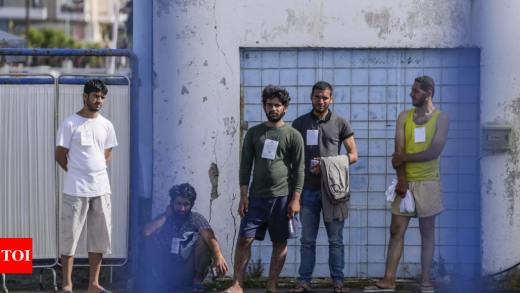In comments to troops late Thursday, Lt. Gen. Herzi Halevi said that there was still “work to be completed” in the north but that the military’s activity would then expand to “more and more regions,” suggesting preparation by the Israel Defense Forces to shift ground forces into the southern part of Gaza.
Halevi was echoed Friday by the head of the National Security Council, Tzachi Hanegbi, who warned that the recent operations were “only the beginning,” adding that “we won’t stop until all of the military and control abilities of Hamas and Islamic Jihad are neutralized.”
Al Jazeera news channel reported Friday that fighting continued around al-Shifa Hospital, Gaza’s largest. Israeli troops stormed the facility Tuesday night after weeks of the military’s maintaining that it was the “beating heart” of Hamas operations in the Gaza Strip.
Israeli officials thus far have presented little evidence to vindicate that claim, aside from a few weapons and images of a large hole in the hospital complex that they assert is the entrance to a tunnel used by militants. On a visit on which they were escorted by IDF personnel, New York Times personnel photographed an image of a concrete shaft with electrical wiring and a metal structure appearing to be a ladder.
The picture emerging from doctors in the hospital is one of terror and privation. Muhammad Abu Salmiya, the hospital’s director, told Al Jazeera on Friday that patients in the intensive care unit had died and that thousands of other wounded people, displaced civilians and hospital staffers were at risk of “extermination.” It was not possible for The Washington Post to verify those claims.
The IDF said that operations in the area were “ongoing” but that operational security prevented it from sharing details at this time.
The Gaza Strip already had been cut off from its meager supply of aid after the United Nations said that fuel shortages and communication blackouts had made it impossible to coordinate humanitarian convoys, and the agency warned that risks of starvation or malnutrition were rising across the territory.
After 16 years of Israeli and Egyptian blockade, the citizens of Gaza had been almost fully dependent on humanitarian aid before the conflict began on Oct. 7 with a deadly incursion by Hamas fighters into Israel. Since then, the World Food Program said Thursday, only 10 percent of the usual food supplies have entered the territory.
Fuel shortages have intensified the suffering in Gaza on almost every level: The main power station has gone dark, and backup generators are out of diesel, leaving many hospitals out of service. The communications network is in a near-total blackout. Earlier this week, WFP confirmed that the final bakery it supported had closed because of a lack of fuel — triggering the same bread shortages occurring in Gaza’s other 130 bakeries.
UNRWA, the U.N. agency for Palestinian refugees, which is coordinating the humanitarian response inside Gaza, said it received some 23,000 liters of fuel — the equivalent of half a tanker — on Wednesday, the first such shipment that Israel has allowed across the Egyptian border with Gaza since the start of the war.
The initial delivery allowed UNRWA to move some trucks carrying humanitarian aid across the border from Egypt into Gaza on Thursday. On Friday, the Israeli cabinet announced that it had approved the entry of 60,000 liters of fuel for use by the United Nations to restore the functioning of sewage and water facilities.
“It’s extremely difficult when you don’t have phones, when you don’t have internet. We cannot coordinate. We lose contact with the vast majority of our staff on the ground,” said Juliette Touma, a spokeswoman for UNWRA. She was able to reach the head of the agency’s office in Gaza on Friday morning via satellite phone, she said. But without normal communications networks functioning, the agency cannot deliver aid, she said.
The lack of communications also has stalled the Gaza Health Ministry’s efforts to count the Palestinian casualties resulting from the Israeli military action. The death toll among Palestinians stood at 11,100 by last weekend, but the Health Ministry figures have not been updated in the past week.
The Hamas attack on Israeli border communities that sparked the war killed 1,200 people inside Israel, and about 200 others were taken back into Gaza as hostages. The IDF said Friday that the bodies of two of those hostages were found in buildings near the hospital, although the military did not clarify whether there was any apparent connection with the facility.
Israeli troops found the body of 19-year-old Cpl. Noa Marciano, and her funeral took place on Friday. On Thursday, the body of Yehudit Weiss, a 65-year-old who had been taken hostage from the Be’eri kibbutz, was recovered. Israeli media reported that her husband was found slain in the safe room of their building after the attack and that Weiss had been battling cancer at the time of her abduction.
“We share in the family’s grief,” said IDF Rear Adm. Daniel Hagari, a spokesman for the military.
Israel’s military operation in Gaza has caused tensions to soar across the region, as Lebanon’s Hezbollah militant group and the IDF trade cross-border strikes, and Iran-linked militants in Iraq and Syria target facilities linked to the U.S.-backed military coalition in those two countries in response to Washington’s firm support for Israel.
The Gaza war also has sparked conflagration in the occupied West Bank. Extremist settlers have used the conflict as a cover to seize rural Palestinian lands. In crowded refugee camps, Palestinian militants say they are preparing escalation of their own as Israeli security forces step up raids in their communities. Several thousand Palestinians have been detained since Oct. 7, with rights groups warning that many of the arrests are arbitrary and that abuse of Palestinians in custody is spiking.
Three Palestinians were killed in an Israeli drone strike during a raid in the city of Jenin, according to WAFA, the official state news agency of the Palestinian Authority, which has jurisdiction in parts of the West Bank. In its own statement on the strike, Israel maintained that five were killed by an IDF “aircraft.”
The IDF described the target as an “an armed terrorist cell that fired at Israeli security forces” and said that several “fled the area of the raid in vehicles and ambulances” toward Ibn Sina Hospital, where they were pursued and arrested by border police.
WAFA reported that Israeli forces “besieged” the Ibn Sina Hospital, interrogating paramedics and demanding the evacuation of the hospital with loudspeakers. The Palestine Red Crescent Society, meanwhile, said ambulance crews at the hospital were detained and searched, “impeding their ability to aid the injured and transport patients.”
Aman Zidan, a doctor at a nearby hospital, told The Washington Post that Israeli forces expanded the dragnet to all ambulance drivers and demanded that staffers at all hospitals gather outside. At the Ibn Sina Hospital, the ICU staff refused, Zidan said.
Doctors Without Borders said last week that Israeli soldiers had repeatedly fired on hospitals in Jenin and blocked ambulances and medical staffers from reaching health-care facilities during raids after Oct. 7. “Hospitals are not targets and must remain safe spaces,” the group said in a statement. “Medical care must not be impeded.”
Loveluck and Parker reported from Jerusalem, Bisset from London and Dadouch from Beirut. Hazem Balousha in Amman, Jordan, also contributed to this report.
#Israel #poised #expand #ground #offensive #northern #Gaza #Strip

